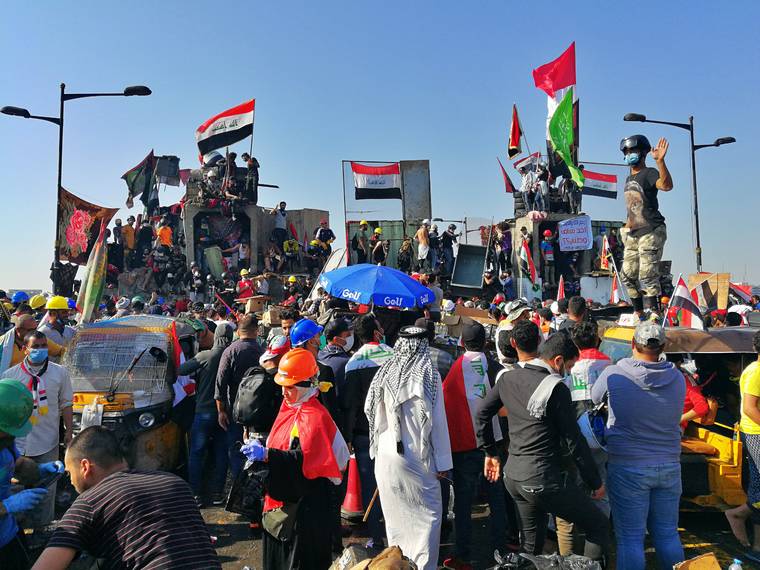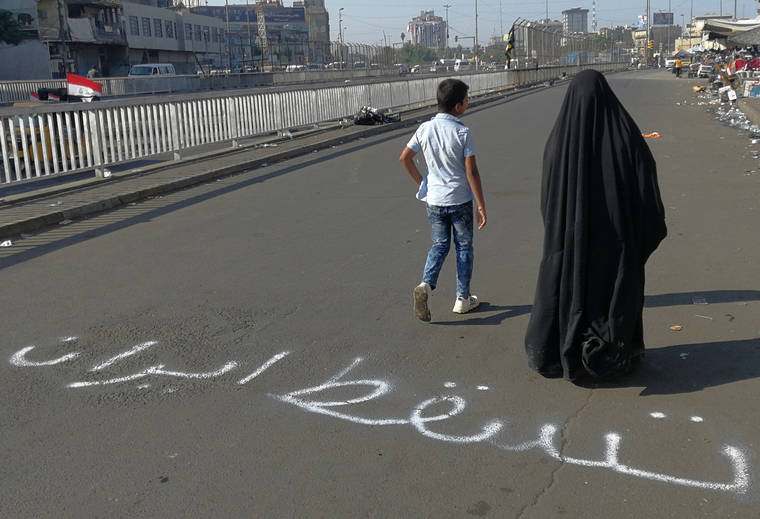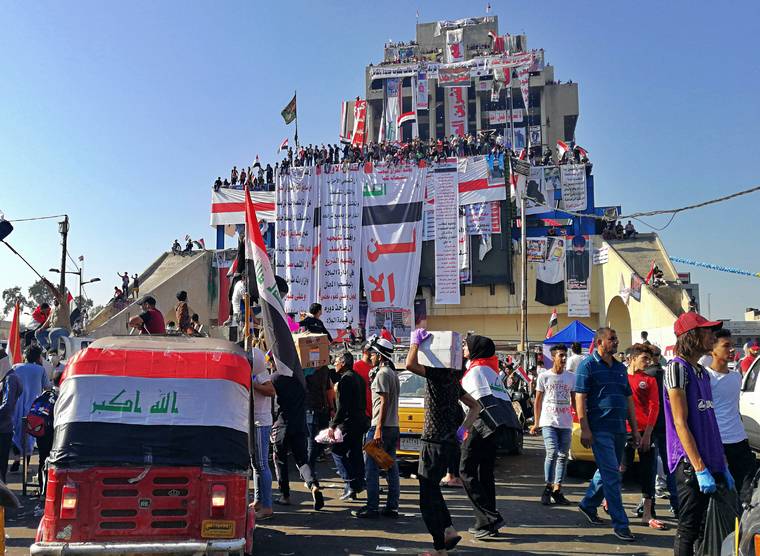BAGHDAD — Tens of thousands of Iraqis massed in Baghdad’s Tahrir Square on Friday in the biggest demonstrations since anti-government protests erupted a month ago, defying security forces that have killed scores of people and harshly criticizing Iran’s involvement in the country’s affairs.
The square and the wide boulevards leading into it were packed with flag-waving protesters, as security forces reinforced barricades on two bridges leading to the heavily-fortified Green Zone, the seat of government. The protesters want sweeping change to the political system established after the 2003 U.S.-led invasion, which they blame for widespread corruption, high unemployment and poor public services.
At least 255 people have been killed in two major waves of protests in the past month, including five who died Friday of wounds sustained earlier, according to security and medical officials who spoke on condition of anonymity because they are not authorized to brief reporters. At least 350 people were wounded Friday as security forces fired tear gas grenades and rubber bullets to drive people back from the bridges.
Many protesters directed their rage at Iran, which emerged as a major power broker after the overthrow of Saddam Hussein and has close ties to powerful political parties and state-backed militias that were mobilized to battle the Islamic State group but have now become an imposing political faction.
Videos circulated online of a group of protesters holding a poster showing Iran’s Supreme Leader Ayatollah Ali Khamenei and the head of its elite Quds force, Gen. Qassim Soleimani, with their faces crossed out. The video, which showed protesters beating the poster with their shoes, appeared to have been filmed Thursday in Tahrir Square. On Friday, protesters marched over an Iranian flag painted on the pavement with a swastika added to it.
This month’s protests in Iraq and similar demonstrations in Lebanon are fueled by local grievances and mainly directed at the political elite, but they also pose a challenge to Iran, which closely backs both governments. An increasingly violent crackdown in Iraq has raised fears of a backlash by Iran and its heavily armed local allies.
On Friday, a group of about 50 militia supporters showed up at the protest, prompting other demonstrators to chant: “Iran take your hands off, the people don’t want you!”
The militias, known as the Popular Mobilization Forces, said in a statement that they stood with the protesters and were committed to protecting them. But the statement warned of “foreign interests” that it said wanted to sow division in order to cause “internal fighting, chaos and destruction.”
The remarks echoed those made by Khamenei and the Iran-backed Hezbollah militant group in Lebanon, which has accused unidentified foreign powers of manipulating the protests.
Iraq’s influential Shiite clerical establishment, which is seen as politically independent, condemned “attacks on peaceful protesters and all forms of unjustified violence,” saying those responsible should be held accountable.
Shiite cleric Ahmed al-Safi, who delivered a Friday sermon on behalf of the clerical leadership, said authorities should not allow “any person or group or biased entity, or any regional or international party” to impose its view on the Iraqi people — an apparent reference to Iran.
The sermon was delivered in the Shiite holy city of Karbala, where masked men suspected of being linked to the security forces opened fire on protesters earlier this week, killing at least 18 people.
Amnesty International says security forces in Baghdad have fired military-grade tear gas grenades directly into the crowds, causing horrific wounds and occasionally lodging the projectiles in people’s skulls. During an earlier wave of demonstrations, snipers shot protesters in the head and chest, with nearly 150 killed in less than a week.
One protester, Ahmad Fadel, showed up dressed head to toe in sniper camouflage that resembled threshed hay.
“All of Iraq is out today against the regime and the corrupt government and parties,” he said. “I’m wearing this as a form of support to the protesters and a message to the sniper who targets protesters: You will not scare us.”
The protesters have called for the resignation of the government and sweeping changes to the political system established after the U.S. invasion, which apportions power among the Shiite majority and Sunnis and Kurds.
Iraq has held regular elections since then, but they have been dominated by sectarian political parties, many of which are close to Iran. The protests have occurred in Baghdad and mostly Shiite southern Iraq, and have been directed against the Shiite-led government. In southern Iraq, demonstrators have attacked and set fire to political party offices.
The protesters accuse their rulers of squandering the country’s oil wealth, pointing to its poor infrastructure and frequent power outages more than 15 years after the overthrow of Saddam and the lifting of international sanctions.
“I was born to be respected, among people who should be respected,” said a protester who identified himself as Abu Sajad. “But as far as we are concerned, we have the worst passport in the world and the worst nationality. We are the No. 1 country when it comes to corruption. We have the second or fourth largest oil reserves but we are a poor nation.”
President Barham Salih said Thursday he would approve early elections once a new electoral law is drafted, expressing support for the protesters but saying reforms would have to be enacted through constitutional means. He said Prime Minister Adel Abdul-Mahdi is willing to resign once political leaders agree on a replacement.
But the process of forming a new government could take weeks or even months, and a Cabinet reshuffle seems unlikely to satisfy the protesters.
Thousands also gathered in the main square of Najaf, another Shiite holy city, late Thursday. Groups of men danced and waved Iraqi flags, while volunteers handed out falafel sandwiches cooked on site.
“This is a great revolution,” said Marwa Ahmed, one of several women in the rally. “We will not give up or back down until our demands are met.”
———
Krauss reported from Beirut.







